
In my last post about books on Permaculture I presented a number of good introductory readings, and then went right ahead with books on food forests. Admittedly, the most immediate application of Permaculture, that is applying patterns observed in nature to human made areas, is in the garden. Extend it a bit further to include pastures, forests, ponds, etc, and your homestead will offer such a plethora of possible ways to apply all techniques and design principles in various ways, that you may not even get to try them all out. And that's perfectly fine. However, Permaculture can be used in many different realms just as well, from manufacturing to economics, and from architecture to sailing.
It is important to mention that Permaculture is not specifically about any of these things. Each subject matter has its own books of reference. So in a sense, once you've read and internalized the basics (and in terms of books, let's say Mollison's Designers' Manual and Holmgren's Permaculture Principles and Pathways) you are ready to apply their concepts to just about any field of study. Some folks have already done this, and written amazing works in their own fields. I'd like to present some of these topic-specific books here.
Fermentation
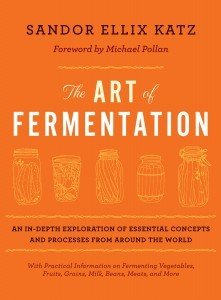
Anyone who grows food is eventually going to face the question of what to do with all the fresh perishables. Modern industrial culture has a one-size-fits-all solution: freezing it. We can do this until our freezer is full and one badly timed blackout ruins everything in it. Otherwise we can look at how food had been preserved before such technical conveniences, and become acquainted with one of the oldest methods: using bacteria to make the food less perishable. There are many examples for doing so, ranging from salami to cheese, from beer to sauerkraut, from tofu to kvass. But even though I had considered myself a connoisseur of ferments, I would never have thought there are as many types as Sandor Katz describes in his book The Art of Fermentation. It is not so much a recipe book as a great overview of how various cultures throughout the world have used cultures to preserve foods and beverages. For me it was highly inspirational and encouraged me to try out many things that I wouldn't even have considered before.
Fungi
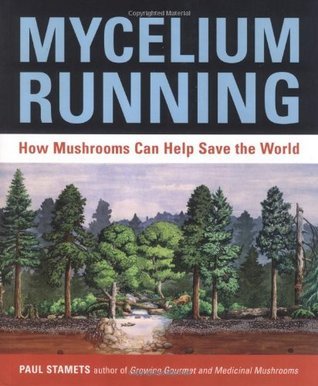
I've always liked mushrooms. They are delicious, some are really good for your health, and some can even offer you funny and enlightening experiences. But it wasn't until I read Mycelium Running by Paul Stamets that I learned that fungi can be used to filter water, keep your house safe from termites, or clean up oil spills. The list goes on, and Stamets has a great way of keeping his reader captivated with each page turned. This book develops an appreciation for this kingdom of species that occupies so many more forms in our world than is attributed to it in common culture.
Architecture


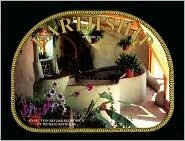
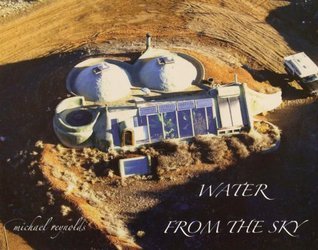

Sustainability doesn't stop once you leave your garden. On the contrary, it starts in Zone 0, that is right where you belong: at home. Reason enough to make your home as sustainable as possible. Mollison mentions various ways, from passively using the sun's energy to capturing rain from your roof, and other experts added their own ideas in various other sources. But combining them all in completely off-grid, self sustaining buildings, that has been done by architect Michael Reynolds in what became known as Earthships. I've posted about them here. Reynolds published a number of books on the subject, explaining the theory and providing step-by-step practical instructions on building them. The nice thing about them is that you don't have to be an architect or a builder to understand what you're reading. Even though many of the techniques he describes are considered “outdated” by his company, they still work beautifully, and offer fantastic solutions to becoming independent from grid utilities. The five titles I can recommend are Earthship 1 How to Build Your Own, Earthship 2 Systems and Components, Earthship 3 Evolution Beyond Economics, Comfort in Any Climate and Water from the Sky.
Toilets
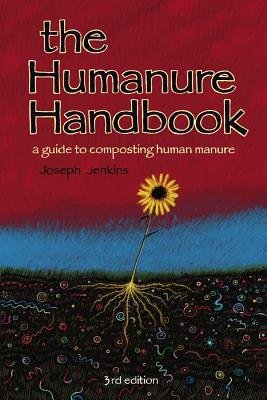
What I see as one of the most basic needs of us humans and our surroundings, also tends to be a relatively sensitive topic for most, namely treating with our bodily wastes in a sustainable manner. I've posted about this topic previously here, here, and even here, and I'm planing on writing more about it. In each case my primary source was The Humanure Handbook by Joseph Jenkins. It just leaves no rock unturned when it comes to composting our excrement and turning it into human manure: What types of pathogens there are and what it takes to neutralize them in terms of time and temperature. How composting works, what kind of changes occur in a compost pile, and how they can be used for making our toilets clean and safe not only for us, but for our garden and the food growing in it.
Invisible Structures



Economics, legal concepts, finance, alternative currencies, community programs, land trusts, cooperatives, grassroots organizations, etc. All these things and many more are referred to as invisible structures by practitioners of Permaculture. Due to their wide and all encompassing nature, and our cultural affinity for the abstract, there is probably more written material available from this area than any other. As a result, it can be a bit hard to find the really good ones, so let me just introduce what I've read and liked. First I want to mention one of my all time favorite books on economy, Sacred Economics by Charles Eisenstein, which I dedicated a post to. Its alternative approach to creating value and meeting our needs is simply fascinating. Two other great books with new outlook on manufacturing at the appropriate scale are Cradle to Cradle by William McDonough and Michael Braungart and Small is Beautiful by E. F. Schumacher. The former I wrote a book review on, the latter I mentioned in my discussion on the Permaculture principle of using small and slow solutions.
Sailing
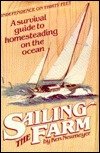
Finally, let me present a book that I greatly enjoyed reading, though I have not been exposed to its subject matter very much in my own life: Sailing the Farm by Kenneth Neumeyer. I love this book for so many reasons. First of all, it takes what is often seen as a way of disposing excess money by rich folks to impress each other, and leads it back to its original idea: a way of living and moving around the world on bodies of water. Neumeyer focuses on sustaining the practice in order to let it sustain you, by teaching how to build a solar water distiller to make seawater potable and a dehydrator to keep fresh fruit from perishing. It even goes on talking about trading, and developing certain skills in order to make your sailing experience permanent, if you so desire. Though written just around the time when the concept of Permaculture was conceived, it reads almost as if the author had grown up with the design principles.
Sources: 1, 2, 3, 4, 5, 6, 7, 8, 9, 10, 11, 12 Pics: 1, 2, 3, 4, 5, 6, 7, 8, 9, 10, 11, 12, 13
Join LBRY To Get Your Own Copies!
If you are interested in reading these books, you can find them on my sustainability channel at LBRY. If you are interested in joining LBRY, please follow my invite. You may also be interested in my other book reviews in my Bibliophilia series:
My 12 Most Recommendable Permaculture Readings
Another 12 Permaculture Books - Specialized Readings
Riane Eisler – The Chalice and the Blade
William McDonough and Michael Braungart - Cradle to Cradle
Charles Eisenstein - Sacred Economics
Ken Kesey - One Flew Over the Cuckoo's Nest
Charles C. Mann - 1491
Tom Wolfe - From Bauhaus to Our House
Ideas and Concepts of Daniel Quinn
B. Traven - The Death Ship and The Cotton Pickers
Books by Wladimir Kaminer
Remembering the Good Doctor Gonzo - Hunter S. Thompson
Tom Wolfe - The Electric Kool-Aid Acid Test
Robert A. Wilson Expanding His Readers' Minds
Gary Jennings' Head-dive into Mexican History
@originalworks
To call @OriginalWorks, simply reply to any post with @originalworks or !originalworks in your message!
For more information, Click Here!
Thank You, @frugallady!
Good job upvoted
Thank you!
Nice selection of books there,
I've got a couple of them. And would like to get Mycelium Running by Paul Stamets.
That's an awesome book if there has ever been one. Very informative, with a constant wow-effect.
Great post you earned a new follower from @thefollower -_- Like money? Read my blogs for more!
"Sacred Economics"! Excellent read! All books by Charles Eisenstein are nothing short of life changing!
If anyone is interested in reading them, he makes all his books available for free online! I attempted to highlight the 'best parts' in these books. I ended up highlighting the whole thing!
https://charleseisenstein.net/books/
I know, I feel the same. Can't seem to promote him enough.
We are doing as much as we can to make our homestead fully sustainable. We have a biofilter-septic system which feeds and waters our bananas and plantains. Next step is going to be composting toilets. Our grey water is used in the gardens. Sun and wind power will be the next big projects.
I have had some great success in fermenating cabbage and would like to make more fermented foods.We have tried growing mushrooms but have not been successful thus far.
Wow, exciting! Are you going to introduce these systems (and recipes) with detailed description and pictures? Would love to read about them! Thank you. :-)
Great post once again. I promise I didn't copy you, I had my post all written yesterday, just didn't publish it until this morning.
I have so much fun reading The Art of Fermentation.
I'm not familiar with the others but will have to keep them in mind when we next have a bit of spare cash for books.
No this is great! That's how we inspire each other. And we always add more info than one person could, anyway.
Some of the books are free to download from the author's website. The Humanure Handbook and Sacred Economics at least are free, maybe some of the others as well.
Whaaaat free books... runs around in circles with laptop in hand, then heads off to find the books...
Well, I could have made it easy and posted the links. (You've probably found them anyway by now.)
http://humanurehandbook.com/downloads/Humanure_Handbook_all.pdf http://sacred-economics.com/wp-content/uploads/2012/01/sacred-economics-book-text.pdf
I found them seconds later. But thanks anyway.
Congratulations @stortebeker! You have completed some achievement on Steemit and have been rewarded with new badge(s) :
Click on any badge to view your own Board of Honor on SteemitBoard.
For more information about SteemitBoard, click here
If you no longer want to receive notifications, reply to this comment with the word
STOPGreat post mate, I have been a fan of permaculture for many years. I believe it can, with other regenerative agriculture methodology feed the hungry and provide food security for us all.
This post deserves more than it's earned. Are you able to sign up for minnow support?
Resteemed
Oh yes, I believe it also can, with all the knowledge our culture has amassed, solve all kinds of social, and other types of problems.
Minnow support... isn't that where you submit articles of others if you think it may qualify? I may be mixing up things here. Gonna check it out right now.
--- Okay, now I am signed up, and submitted the post for an upvote. Let's see what happens. Still in the process of wrapping my head around things. That discord channel seems a lot like the slack ones I'm (not sufficiently) active in. Now with discord it feels like I'm spreading myself even thinner. But hey, let's wait and see.
How long have been part of minnow support? And other similar programs? How would you compare them? For me, randowhale seems dependable but costly, curie incredible but out of commission whenever I try, and the rest I tried were without much result.
Congratulations my friend :) good post.
Thank you. And Thank you also for recommending minnow support. As it turns out, it was worth it.... waaaay worth it. Though I suspect there is also a curie vote in it somewhere (not that I'm complaining).
It makes a .50 into a 1.00 just helps to feel like you're not back pedaling. the Curie was a great boon. One day i'll get one!
Peace, Abundance, and Liberty Network (PALnet) Discord Channel. It's a completely public and open space to all members of the Steemit community who voluntarily choose to be there.Congratulations! This post has been upvoted from the communal account, @minnowsupport, by stortebeker from the Minnow Support Project. It's a witness project run by aggroed, ausbitbank, teamsteem, theprophet0, someguy123, neoxian, followbtcnews/crimsonclad, and netuoso. The goal is to help Steemit grow by supporting Minnows and creating a social network. Please find us in the
This post has received a 1.04 % upvote from @drotto thanks to: @banjo.
very good post !
Good one! You just found a new follower
A followER or a followEE, hehehe? ;-)
Thanks for following, and I also like your intro post, and I'm looking forward to your human rights related posts.